| The neutrality of this article is disputed. Relevant discussion may be found on the talk page. Please do not remove this message until conditions to do so are met. (June 2024) (Learn how and when to remove this message) |
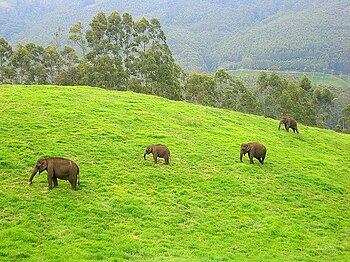
Elephants found in Kerala, the Indian elephants (Elephas maximus indicus), are one of three recognized subspecies of the Asian elephant. Since 1986, Asian elephants have been listed as endangered by IUCN as the population has declined by at least 50% over the last three generations, estimated to be between 25,600 to 32,750 in the wild. The species is pre-eminently threatened by habitat loss, degradation and fragmentation. Along with a large population of wild elephants, Kerala has more than seven hundred captive elephants. Most of them are owned by temples and individuals. They are used for religious ceremonies in and around the temples, and some churches, and a few elephants work at timber yards.
Elephants in Kerala are often referred to as the "sons of the sahya" (cf. poem "Sahyante Makan" by Vyloppalli Sreedhara Menon). As the State Animal, the elephant is featured on the emblem of the Government of Kerala state, taken from the Royal Arms of both Travancore and Cochin. It is believed that an elephant that has been captured in the wild, and tamed, will never be accepted by other wild elephants.
Elephants in festivals
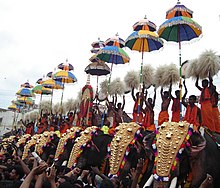
Many prominent temples in Kerala own elephants, many of which are donated by devotees. Elephants are a core part of ritual worship in the famous Guruvayur temple which owns more than 60 elephants. The world's only Elephant Palace is constructed in Punnattur Kotta, 3 km from the Guruvayur temple, to house the temple's elephants. A famous elephant, named Guruvayur Kesavan, belonged to this temple. Elephants carry the deity during annual festival processions and ceremonial circumnambulations in the Hindu temples. The temple elephants are decorated with gold plated caparisons ("nettipattam"), bells, and necklaces. People mounted on the elephants hold tinselled silk parasols ("muttukuda") up high, swaying white tufts ("vencamaram") and peacock feather fans ("alavattam") to the rhythm of the orchestra. Seventeen elephants are engaged for the daily ceremonial rounds to the accomplishment of Pancari Melam in Kudalmanikyam temple.
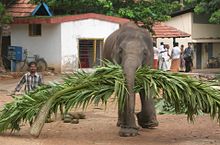
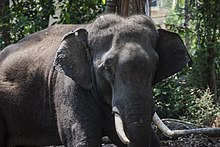
Elephants in history and legends of Kerala
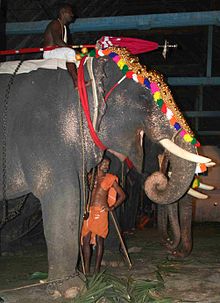
Many elephants are featured in the local legends of Kerala. Aitihyamala ("A Garland of Historical Anecdotes") by Kottarathil Sankunni was written in eight volumes; each volume ending with a story or legend about a famous elephant.
Elephant care
Each elephant has three mahouts, called paappan' in the Malayalam language. The most important duty of the mahouts is to bathe and massage the elephant with small rocks, and the husk of coconuts. In the monsoon season, the elephants undergo Ayurvedic rejuvenation treatments which include decoctions with herbs, etc.
In November 2014, Mathrubhumi reported the incident of a tamed elephant, Indrajit, being released to the wild. To avoid the troubles a tamed elephant may face in the wild, special arrangements were made by the forest-wildlife departments of the Government of Kerala, to ensure a smooth transition. The elephant is 15 years old and is expected to live for another 50 years. Elephants have huge market value in a state like Kerala.
Accusations of cruelty towards elephants
Around 700 elephants are owned by people and temples. These elephants are rented out for more than 10,000 festivals and processions in which a single elephant may generate revenue up to $5000 a day according to their status. These animals have to endure long and noisy parades, loud firecrackers, may need to stand near flames, travel long distances in open shabby vehicles and walk on tarred roads in the scorching sun for hours, denying even food, water and sleep, in the name of religion and tourism promotion.
Biologist V. Sridhar accuses temple boards of greed and coercing aggressive elephants unsuited to such tasks by going to the extent of hobbling them even with spike chains on their forelegs. He further claims that due to the increasing work load, elephants in their prime (20–40 years of age) seem to be dying prematurely. He suspects that increase in death toll - due to intestinal obstruction and other digestive problems - is indicative of potential increase in physiological and psychological stress. There have been reports by three official committees that investigated the abuse of elephants at Guruvayur, and which have detailed the abuses inflicted on the Temple Elephants, in violation of various animal welfare laws in India.
On 8 April 2021, the death of Ambalappuzha Vijayakrishan sparked a controversy in Kerala. The elephant lovers accused Devaswom Board and its mahout for killing the elephant. According to them, for several months prior to his death, the elephant were tortured by its mahouts and was used by the board for parading in spite of him having severe injuries.
Notable elephants from Kerala
Further information: Category:Elephants in Kerala Further information: List of individual elephantsElephant ornamentation
| This section does not cite any sources. Please help improve this section by adding citations to reliable sources. Unsourced material may be challenged and removed. Find sources: "Elephants in Kerala culture" – news · newspapers · books · scholar · JSTOR (June 2024) (Learn how and when to remove this message) |
One of the famous families in Thrissur District of Kerala, the Venkitadri family, has made ornaments for three generations, especially for the famous Thrissur pooram, the most famous of the Hindu temple-centred festivals. They make gold plated caparisons, umbrellas, alavattam, venchamaram, and necklaces. They decorate 150 elephants with ornaments for temple festivals. Thrissur Pooram, Nenmara Vallangi Vela are some of the famous festivals in kerala in which more decorated elephants are used for procession.
Elephant Conservation in Kerala
Kottur Elephant Sanctuary and Rehabilitation Centre in the Thiruvananthapuram district is the India's first and world's largest elephant rehabilation centre, opened with an aim to protect and rehabilititate elephants. Other elephant care centers in the state includes Kodanad Abhayaranyam animal shelter and elephant training centre and Elephant Training Center, Konni.
Elephant Survey in Kerala
Kerala Forest and Wildlife Department has conducted a statewide census in Kerala in November 2018, necessitated by an order issued by the Supreme Court. In this survey, over 5706 elephants were counted. Thrissur recorded the highest number of elephants (145) and Kannur has the lowest elephant population (3). Kasargod has no elephants.
See also
- Cultural depictions of elephants
- Thrissur Pooram
- Kottur Elephant Sanctuary and Rehabilation Centre
- Elephant Training Center, Konni
- Kodanad Abhayaranyam animal shelter and elephant training centre
- Temples of Kerala
References
- Williams, C.; Tiwari, S.K.; Goswami, V.R.; de Silva, S.; Kumar, A.; Baskaran, N.; Yoganand, K.; Menon, V. (2020). "Elephas maximus". IUCN Red List of Threatened Species. 2020: e.T7140A45818198. doi:10.2305/IUCN.UK.2020-3.RLTS.T7140A45818198.en. Retrieved 20 September 2024.
- For details cf. George Menachery, "The Elephant and the Christians", SARAS, Ollur, 2014 where the emblems of early Cheras, Kochi, Travancore, Tirukkochi(Travancore-Cochin), and Kerala States with the elephant emblems are given.
- "Aanayum Nazraniyum The Elephant in Kerala Churches" (PDF).
- South India. Rough Guides, 2003; ISBN 1-84353-103-8. p. 305
- "Vaikom Thiruneelakantan". Archived from the original on 27 May 2011.
- "Mathrubhumi Weekend, Sun, 23 Nov 14". Archived from the original on 19 August 2018. Retrieved 24 November 2014.
- "Latest news".
- ^ "India's overworked elephants". BBC. 4 March 2010. Retrieved 22 December 2019.
- ^ "Cruelty against elephants". The Hindu. Archived from the original on 19 April 2012. Retrieved 11 August 2012.
- "The sinking ark, where the survivors are trying to loot as much revenue from the ark, before it is completely sunk". 6 February 2015.
- "Before the last trumpet". 30 March 2013.
- Sekhar, Rukmini (24 October 2015). "Gods in Shackles". The Hindu.
(The investigations) ... reveal a violation of several laws and guidelines such as The Prevention of Cruelty to Animals Act...
- "Tusker Ambalappuzha Vijayakrishnan dies, activists allege ill-treatment - The New Indian Express". www.newindianexpress.com. 10 April 2021. Retrieved 26 April 2021.
- "India's first elephant rehabilitation centre in the works at Kerala's Kottoor". Hindustan Times. 8 July 2019. Retrieved 20 February 2021.
External links
- Hasthyaayurvedam (Encyclopaedia of elephants and their treatment) The original book is in Sanskrit but Vaidyamadham Cheriya Narayanan Namboodiri has translated Paalakaapyam (Hasthyaayurveda) from Sanskrit to Malayalam.
- Association of elephant lovers to protect elephants.
- Mahout manual.
- About 520 captive elephants in Kerala
| Elephants | |||||||
|---|---|---|---|---|---|---|---|
| General |
| ||||||
| Human use |
| ||||||
| Culture and history |
| ||||||
| Related | |||||||